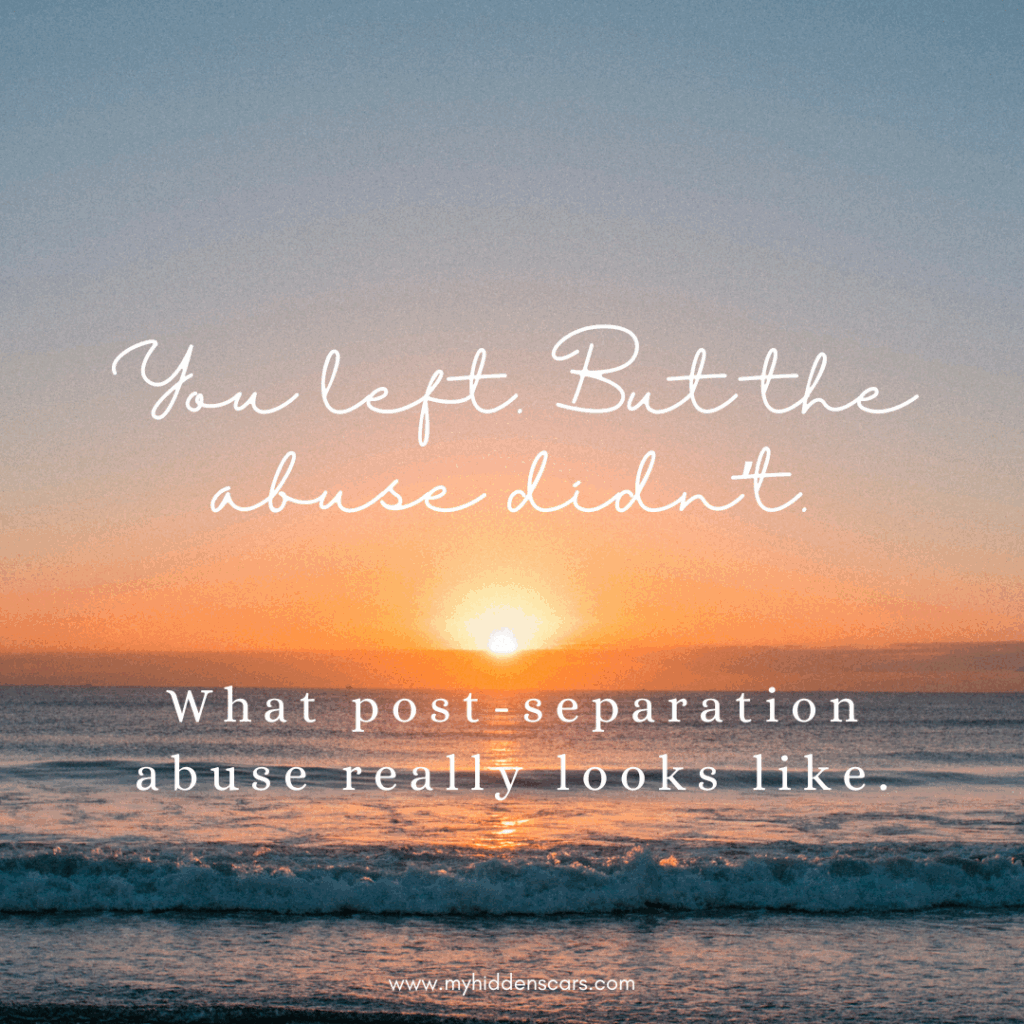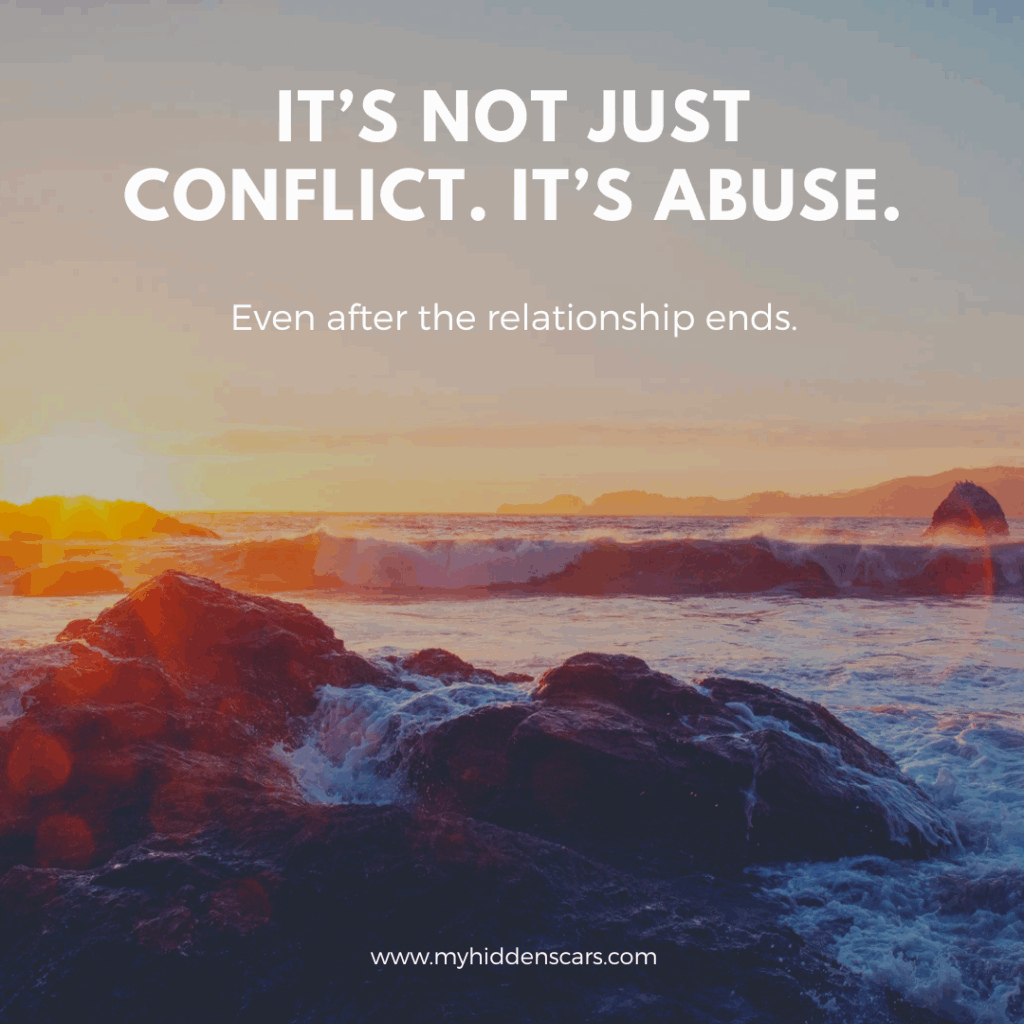Why it still hurts, how it shows up, and what survivors need to know when the abuse doesn’t end after the relationship
Post-separation abuse doesn’t always end when the relationship does.
If you’ve left but the fear, control, or chaos never really stopped, this is for you.
Leaving didn’t end the abuse. It just changed the way it looked.
I never wanted to go back. Not once. I didn’t miss the fear, the mind games, or the way everything always had to revolve around him.
But I also didn’t expect how much post-separation abuse would still hurt after I left, how the abuse would keep showing up, just in different forms. I never wanted to go back. Not once. I didn’t miss the fear, the mind games, or the way everything always had to revolve around him.
But I also didn’t expect how much it would still hurt after I left, how the abuse would keep showing up, just in different forms.
Just recently, one of my kids got caught in one of his dad’s power games, unclear expectations, harsh lectures, and guilt trips for not getting it “right.” When our son asked to come home, his dad refused to let him go. My daughter stepped in to help. She knocked, he opened the door, and she calmly said why she was there. He threatened her with trespassing anyway. He took photos of her car.
He has a history of stalking. That wasn’t about the car. It was about control.
And that’s the part people don’t see.
They think once you leave, things get better. Safer. Simpler.
But when you share children with someone who’s still determined to control, punish, or undermine you, what you get instead is post-separation abuse.

What Post-Separation Abuse Can Look Like:
- Weaponizing the court system over petty financial shifts, while hiding significant assets
- Demanding compliance with his parenting time, while freely changing or violating yours
- Keeping secrets or playing “gotcha” with the kids and with you
- Threatening your kids, your safety, or your peace through legal threats or intimidation
- Managing his image so well that no one believes he’s still abusive
These aren’t isolated events. This is a pattern I see over and over again, in my life, and in the lives of the women I coach.
It’s Not Just Co-Parenting Conflict If…
- You’re afraid to ask for what you need
- He punishes your child to get back at you
- He uses legal threats to control your life
- Your child feels like the messenger, mediator, or spy
- You feel like you can’t move on because he always pulls you back in
This is not miscommunication. It’s not just a hard divorce. It’s a continuation of control, and it’s post-separation abuse.

Why It Still Hurts After You Leave
You can end the marriage, but not the manipulation. You can stop living in the same house, but you can’t always stop the damage, especially when kids are involved.
You try to build a new life, but the old one keeps creeping back in. You try to co-parent, but you’re the only one trying. You try to protect your children and your peace, but both are constantly under pressure.
And then there’s the outside world: people who say, “Well, he is their dad…” or “At least it’s over now.” They mean well, but they don’t see the email threats, the court filings, or the fear your kids carry home.
What Helped Me (And What I Now Help Others With)
- I stopped calling it “conflict” and started calling it what it was, abuse.
- I got support from people who understood the patterns and didn’t need me to explain everything.
- I made a plan that helped me feel steady again.
- And I documented everything in a way that protected me, emotionally, legally, and strategically.
I didn’t realize how much I was second-guessing myself until I started writing things down. Abuse is confusing on purpose. Documentation helped me get clear.
I started simple: the date, what happened, and how it affected me or the kids. Later, I began saving screenshots, voicemails, even brief notes about how it made me feel. It all added up, and it mattered, especially in court.
If you don’t know where to start, start small. One sentence a day can become your proof, your peace of mind, and your power.
I walk through exactly what to track and how to do it safely in The Hidden Power of Documentation.
I wrote about the broader patterns of post-separation abuse here: Post-Separation Abuse & Domestic Abuse by Proxy.
But this, this is what it feels like day to day. This is why it’s so hard to explain to anyone who hasn’t lived it.

Gut Check: Is This Still Happening to You?
Ask yourself:
- Am I constantly adjusting my behavior just to avoid setting him off?
- Have I lost sleep, money, or peace because of his actions, even after the relationship ended?
- Do I feel more like I’m surviving him than co-parenting with him?
If you nodded yes to even one of these, this isn’t just a tough breakup.
It’s post-separation abuse. And no, you’re not doing it wrong.
You Deserve More Than Just Survival
This is the work I do.
I support women who are still in it, even after the relationship ends. The ones doing their best to stay strong for their kids while navigating custody, court, and constant pushback from someone who hasn’t stopped trying to control them.
If that’s you, I want you to know you’re not alone. You’re not imagining it. And you’re not doing it wrong.
There are ways to protect your peace, even in the middle of the mess. If you’re ready for support from someone who actually gets it, I’m here.
But even if you’re not ready to reach out yet, please take this with you:
You’re not too sensitive.
You’re not overreacting.
You’re surviving something most people don’t see.
And you deserve support that sees the whole picture.





